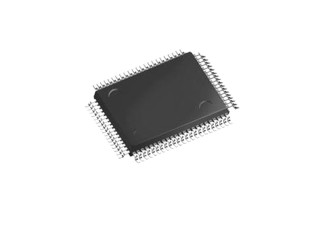SL11R-IDE-B1.2
- Product Code: SL11R-IDE-B1.2
- Availability: In Stock
Overview
The SL11R is a low-cost, high-speed Universal Serial Bus (USB) RISC based Controller. It contains a 16-bit RISC processor with built-in SL11R BIOS ROM to greatly reduce firmware development work. Its 2-wire serial EEPROM interface offers low cost storage for USB device configuration and customer’s product-specific functions. New functions can be programmed into the 2-wire serial interface by downloading them from a USB Host PC. This unique architecture provides the ability to upgrade products in the field without changing the peripheral hardware.
SL11R Features
• Cypress offers a Development Kit for each of its product lines. These Development Kits include multiple peripheral Mini-port class drivers for Windows 98/ME/2000, firmware source code and demo USB source code for a variety of applications. Also available is an SL11R “C” compiler, debugger, and assembler with a reference demo board.
• 48 MHz 16 bit RISC Processor
• Up to 16 bits of Programmable Bidirectional Data I/O
• Up to 32 bits of General Purpose I/O (GPIO)
• 6Kx8 internal Mask ROM with built-in BIOS in supporting a comprehensive list of interrupt calls (see [Ref. 1] SL11R_BIOS for detailed information). These include USB functions, 2-wire serial interface, and UART and Boot-Up options (Boot-up from 2-wire serial interface or External ROM). Executable code can also run from 8-bit or 16-bit external Memory.
• 3Kx8 internal RAM that can be configured as the USB Ping-Pong buffer for USB DATA0 and DATA1 packets. It also can be used for data and/or code.
• Two-wire serial EEPROM interface port with SL11R BIOS support to allow on-board EEPROM programming
• Flexible Programmable external memory wait-states and a 8/16 data path
• Up to 16-bit address for Extended Memory Interface Port for External SRAM and ROM
• On chip DRAM Controller
• On chip fast EPP Interface
• On chip 8/16-bit DMA data path interface
• Supports 12 MHz/48MHz external crystal or clock
• Executable code or data can be loaded either from the USB port or via the UART port. The code/data is moved to RAM for debugging purposes (using a break point register), or to be programmed via a two-wire serial EEPROM.
• USB Port (12 Mbits/sec), including a built-in USB transceiver. All USB standard protocol modes are supported: Isochronous mode (up to 1024 packet size), Bulk, Interrupt, and Control modes.
• There are four available Endpoints. Each endpoint utilizes a bidirectional DMA port to move data between the Memory and the USB. Data can be sent/received to/from the Data Port Independently.
• Two General Purpose Timers, a Watchdog timer (WDT), four programmable PWM channels, and four Programmable Timing Generator outputs
• Four PWM or Programmable Timing Generator output channels are available. Each channel provides a programmable timing generator sequence that can be used to interface to various CCD, CIS, and CMOS image sensors, or can be used for other types of applications.
• Suspend/Resume and Low Power modes are supported
• UART interface supports from 900 Baud to 115.2K Baud
• USB Generic Mini-Port Driver for WIN98/2000 is available
• Debugger and QT-Assembler are available
• “C” Compiler option available
• Package: 100 LPQFP
• Power requirements 3.3V

